MALAYSIANKINI | Distinguished Professor Shamsul Amri Baharuddin is a familiar face as an author, pundit, and analyst.
Now head of the National Council of Professors, he played a role in shaping the academic direction in his chosen field of social anthropology as the founding director of the Institute of Ethnic Studies (Kita), Universiti Kebangsaan Malaysia (UKM).
In 2010, he was selected as one of the five Distinguished Professors by the Higher Education Ministry and was made National Council of Professors chairperson in 2019.
Not one to rest on his laurels, he is now busy working on a series of four books that he intends to publish in the coming years, each containing chapters selected from his numerous academic articles published in the last four decades.
Among the books he has authored in the past include 'From British to Bumiputera Rule: Local Politics and Rural Development in Peninsular Malaysia (1986)', 'Malaysia's Vision 2020: Old Ideas in a New Package? (1992)', 'Enhancing Inter Ethnic Relations in Malaysia (2008)' and Unity, Cohesion, Reconciliation: One Country, Three Cherished Concepts (2014)'.
Still sporting his trademark long hair, he told Malaysiakini of the various twists and turns his life has taken.
“I am from Jempol in Negri Sembilan and I’m the oldest of five children but I’m the last surviving one so this has taught me that life comes with loss,” said Shamsul, who will turn 73 in January.
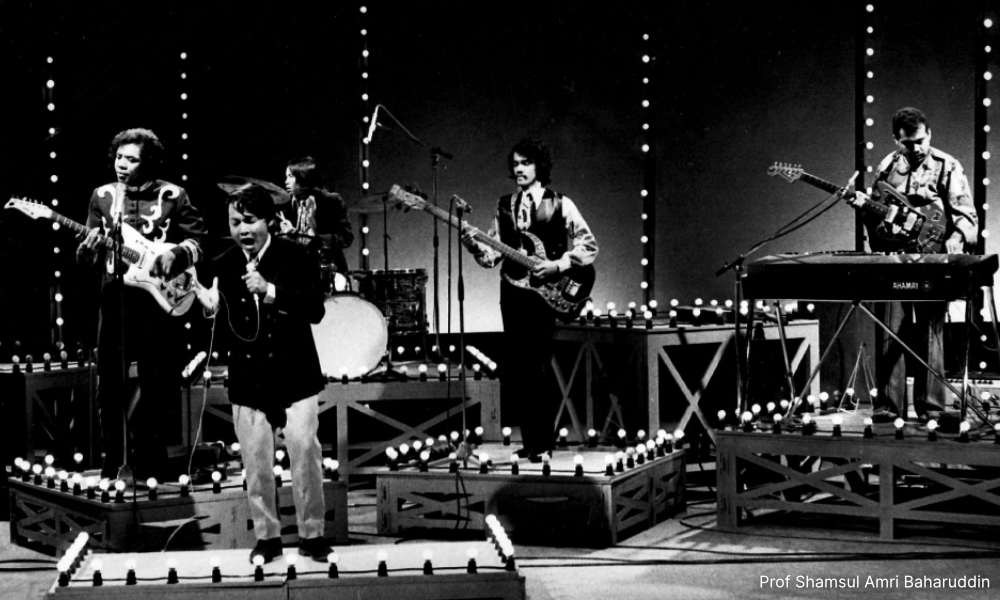
Surprisingly, for a man with multiple qualifications in anthropology and sociology, it was not his initial intention to be an academic.
“I really wanted to be a rock star in my late teens. I got my start singing in a school choir at the time and, later on, I was in bands. I was juggling that while as a student but I suppose, ultimately, that was not to be my profession.
“I have a strong affinity for music to this day. I listen to music to calm me down, anything from Michael Bublè to Eric Clapton even lagu keroncong, which has a very close relationship with Indo-Malayan nationalism of the Sukarno era.
“In fact, in the early 1970s, I was involved in musical programmes at RTM and met Indonesian singers and musicians like Bing Slamet (singer of the leftist folk anthem Gendjer Gendjer) and Saiful Bahari. Another great singer from that time was Titiek Puspa and I was very influenced by the message of the music, not just the melodies by themselves,” he recalled.
Turbulent times
After graduating with an honours degree in anthropology and sociology from Universiti Malaya (UM) in 1973, Shamsul went on to do postgraduate studies in the sociology of development. The next year, however, there was a major crackdown on student activists, with a number of leaders detained under the draconian Internal Security Act.
He noted wryly that the education minister then was Dr Mahathir Mohamad and the top student leader was Anwar Ibrahim, who was detained for nearly two years. Shamsul’s own mentor, the socialist leader Syed Husin Ali, was also detained in 1974, eventually going on to spend six years in detention without trial.
“I was surprised that I was not detained during that time. He was my mentor at UM and I shared a room with him. After a while, I used to go and visit him weekly at Kamunting, sometimes with his family. I promised him that I would keep the work area clean,” recalled Shamsul.
He obtained his Masters from UM in 1976 and ultimately got his PhD in Social Anthropology from Monash University in Melbourne, Australia in 1983.
It was altogether a momentous period of his life as Shamsul lost two friends in the most notorious of air disasters of the 1970s.
First came the Double Six tragedy of June 6, 1976, which took the lives of then Sabah chief minister Fuad Stephens and several other state leaders.
“It was a terrible accident and my roommate Ishak Atan was on board. He was private secretary to Tengku Razaleigh Hamzah who was supposed to be aboard. But at the last moment, they switched and it was Ishak who lost his life. It was just fated.”
The next year came the Tanjung Kupang air crash on Dec 4, 1977. Malaysian Airlines flight MH693 was hijacked mid-air and crashed after the hijacker shot the pilot dead following an argument over the lack of fuel to take him to his intended detour.
“I couldn’t believe it, you know. I knew the captain, Captain GK Ganjoor, who was an Indian national. We used to play squash together at the UKM courts in the old campus of Jalan Pantai. The hijacker apparently shot him dead and that led to the fatal crash in which 100 lives were lost including then agriculture minister Ali Ahmad,” said Shamsul.
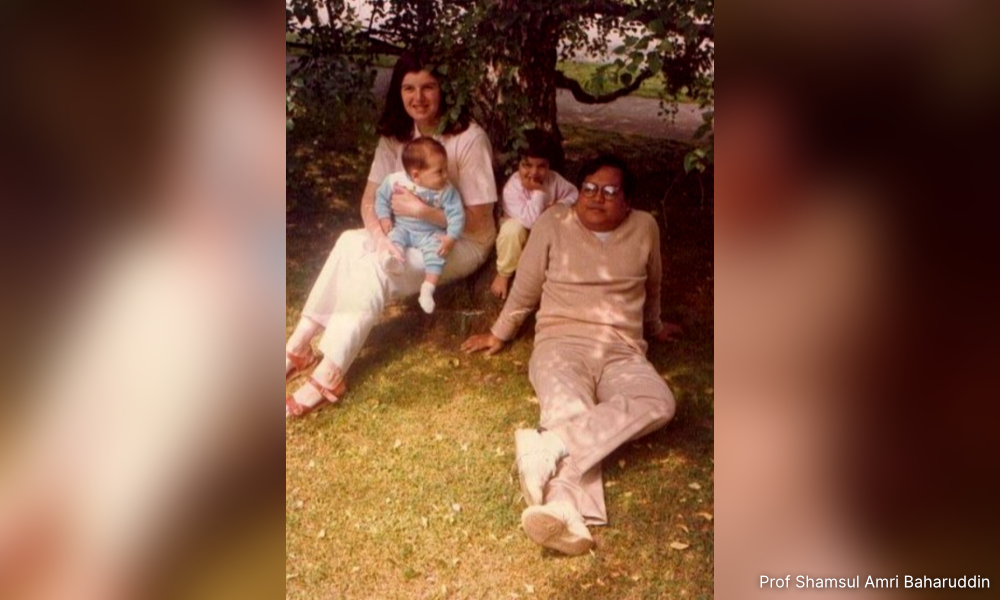
On the personal front, Shamsul met his wife Wendy Smith, an Australian who was doing her PhD research in Malaysia comparing Japanese work culture to that of other Asian nations. The couple married in 1979 and went on to have two children.
“I even lived in Japan, intermittently, for three years and my kids went to kindergarten there. There were also other exchanges where I went to such as CNRS Paris, Toulouse University in France, and also in Holland and Germany.
“Even now, my family is spread across various time zones, as my son is in Finland and my daughter lives in Australia. My wife moved back there after a serious illness and we decided that the facilities were better suited to her recovery there.”
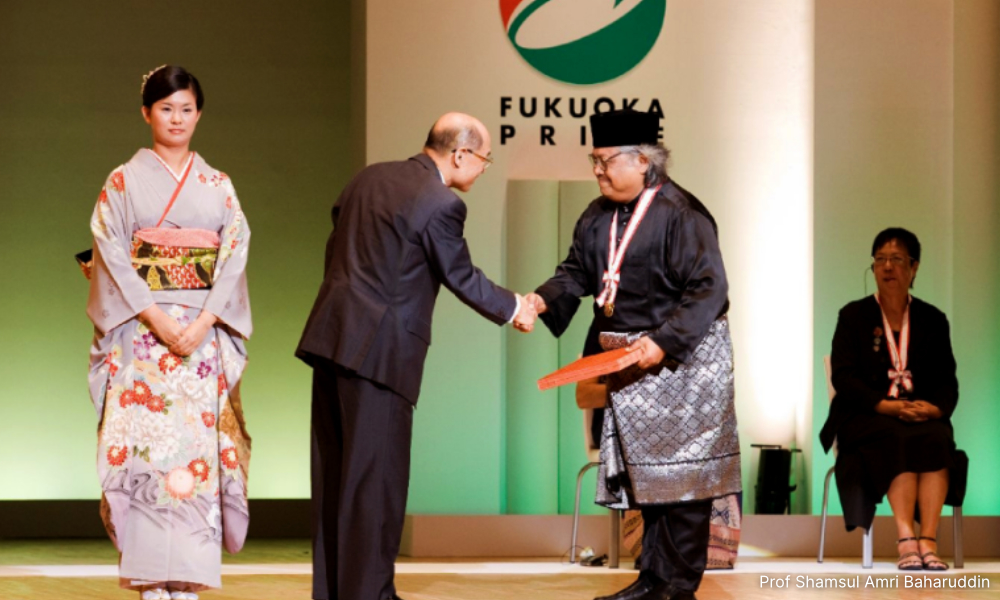
In 2008, Shamsul was awarded the prestigious Academic Prize of Fukuoka Cultural Award (above), for promoting Southeast Asian studies globally. He is the only second Malaysian recipient of the Award after Royal Professor Ungku Aziz who received it in 1993. Over the years, Shamsul has made a name for himself as a commentator on a wide range of issues.
“Up until now I’ve only written four books, but I have written more than a hundred articles as a columnist for the Dewan Bahasa dan Pustaka (DBP) magazine Dewan Masyarakat (1986-1996) and Dewan Budaya (2001-2010), occasionally getting into some controversies.
“I didn’t even know that some material from my columns appeared in national exams like SPM. I was being teased that hundreds of thousands were reading my writing!” he joked.
He recalled his work on an early book called 'Daun-daun Kemarau' (parched leaves) published in 1982. It was about the work of the poet Sabar Bohari, who had been headmaster of his school in Sungai Besar.
“This taught me that you must write stories from the heart. Not just high-sounding concepts that the common man won’t understand,” said Shamsul.
Four books planned
Early next year, Shamsul will publish a new book through UKM Press called 'The Muslim Society Observed'.
“This is the first of four volumes; I want to write about the pristine Islam which comes from Mecca and Medina, and how that is embedded in local culture.
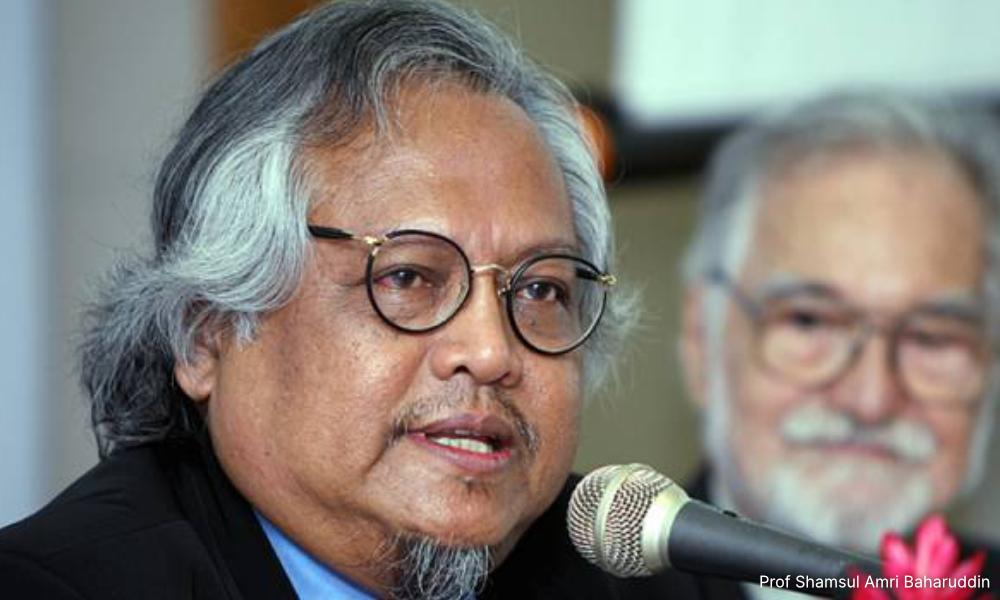
“If you go to different parts of Malaysia, you will find different variations and subtle adoptions of local practice,” he said.
His second book will be on colonial knowledge and rule and how it is still dividing us.
“Can you imagine how the census carried out by the British was used to create differences among us that still impact us until today?
“When people talk about 3R (race, religion, royalty), you just can’t focus on the Malays as all of us have it.
“Colonial history is a discourse embedded within colonial knowledge. And the British approached world history differently because they were an empire. The census was really about classifying human beings for budget and administrative purposes, and yet it became a tool to divide and conquer.
“At some point, it became about surveillance and security. After World War II they gave us ICs because they wanted to separate Communists from the rest. The nature of our country today is created by those boundaries of yesterday,” he said.
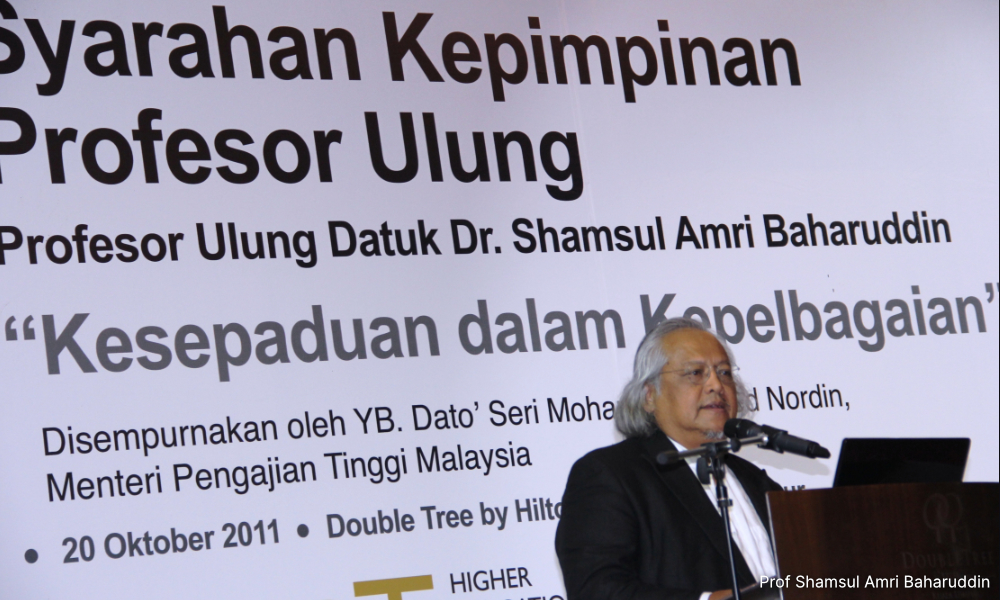
Shamsul said his third book will be about contesting identity in Malaysia, while the fourth will talk about rural development and the evolution of the NEP.
“If you ask me, NEP is supposed to be need-based without considering ethnicity. The Second Malaysia Plan wanted to redistribute wealth by creating a bigger cake and increasing Malay participation.
“Somehow, a lot of corruption got involved and good things become sullied. There should be affirmative action but it should not be totally racial, it must help all poor,” he said.
Shamsul also told Malaysiakini that the issue raised recently by award-winning student Nahvin Muthusamy about discrimination in education should not be swept under the carpet.
“It is good of him to speak up. But we must engage to make sure there is proper change, not just something that is forgotten by next week.”
He said the issues in question have developed gradually and generally since the NEP was introduced in the 1970s.
“While there is a correlation between poverty eradication and education, this guy would not be happy about affirmative action and the way it has manifested. There are many issues to be discussed,” said Shamsul.
Future challenges
While warning against the increasing political polarisation, Shamsul said that Malaysians need to come to an understanding and balance in their aspirations.
“In Malaysia, we don’t have unity, but some kind of cohesion, we can agree to disagree and yet move on,” he said, adding that it was a core theme when he was invited to deliver a public lecture on ‘Social Cohesion in Malaysia’ at St Catherine’s College, University of Cambridge in March this year.
Shamsul was also the unity adviser of the National Unity Ministry from 2020-2022.
“There is no more ideology in Malaysia, there is all strategic positioning for personal interest. It’s about friends becoming enemies, and vice versa. Despite all our changes, most of the leaders today went to Umno kindergarten.
“Anwar has his work cut out to grow the economy, maintain his leadership, and carry out reforms. How he can do this while balancing the interests of the elites, the Malay masses, and the non-Malays is a huge challenge.
“At the same time, I don’t think PN can really win an election now. To get numbers is not that easy. They can’t speak well and put across their points for an alternative agenda, so they just harp on race and religion.
“There is no real big issue for them to convince the urban and middle class that they have the right alternatives to this current government,” he said.
MALAYSIANSKINI is a series on Malaysians you should know.




No comments:
Post a Comment
Note: Only a member of this blog may post a comment.